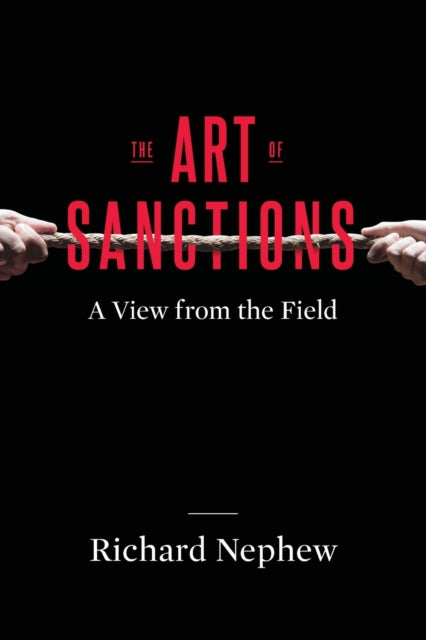Richard Nephew
The Art of Sanctions: A View from the Field
The Art of Sanctions: A View from the Field
YOU SAVE £3.82
- Condition: Brand new
- UK Delivery times: Usually arrives within 2 - 3 working days
- UK Shipping: Fee starts at £2.39. Subject to product weight & dimension
Bulk ordering. Want 15 or more copies? Get a personalised quote and bigger discounts. Learn more about bulk orders.
Couldn't load pickup availability
- More about The Art of Sanctions: A View from the Field
Nations and international organizations use sanctions as a means to achieve their foreign policy aims, but they must be executed with a clear strategy and responsive to the target's behavior. Richard Nephew's The Art of Sanctions offers a practical framework for planning and applying sanctions that focuses on calibrating along the way and deciding when sanctions have achieved maximum effectiveness. Understanding the interplay of pain and resolve is central to using sanctions successfully and humanely, and Nephew provides policymakers with practical guidance on how to measure and respond to pain and resolve in the service of strong and successful sanctions regimes.
Format: Paperback / softback
Length: 232 pages
Publication date: 07 March 2023
Publisher: Columbia University Press
Sanctions are becoming increasingly popular among nations and international organizations as a tool to achieve their foreign policy objectives. However, their effectiveness hinges on a well-thought-out strategy that responds to the specific nature and behavior of the target. In his book, "The Art of Sanctions," Richard Nephew provides a comprehensive framework for planning and implementing sanctions that goes beyond the initial strategy. He emphasizes the importance of calibrating sanctions along the way and making informed decisions about when they have achieved their maximum impact.
Nephew, who has extensive experience in designing and implementing sanctions on Iran, offers guidelines for interpreting the responses of targets to sanctions based on two critical factors: pain and resolve. Pain refers to the negative consequences that a target experiences as a result of sanctions, such as economic losses, political isolation, and human suffering. On the other hand, resolve refers to the target's determination to resist, tolerate, or overcome the pain imposed by sanctions.
Understanding the interplay between pain and resolve is crucial for using sanctions both successfully and humanely. Policymakers need to be able to identify when diplomatic intervention is likely to be effective or when escalation is necessary. By focusing on lessons learned from sanctions on Iran and Iraq, Nephew provides policymakers with practical guidance on how to measure and respond to pain and resolve in the service of strong and successful sanctions regimes.
One of the key insights from "The Art of Sanctions" is that sanctions should be tailored to the specific circumstances of each case. Nephew argues that one-size-fits-all approaches to sanctions are often ineffective and can even exacerbate the problem. Instead, policymakers should consider the political, economic, and social context of the target and tailor their sanctions accordingly.
Another important aspect of Nephew's framework is the importance of monitoring and evaluation. Policymakers need to establish clear metrics and indicators to measure the effectiveness of sanctions and make adjustments as necessary. This includes assessing the impact of sanctions on the target's behavior, as well as the broader political and economic context.
Furthermore, Nephew emphasizes the need for a coordinated approach to sanctions. Sanctions should be implemented by multiple actors, including governments, international organizations, and private companies, to ensure that they are effective and sustainable. This requires close collaboration and communication among these actors to ensure that sanctions are implemented in a consistent and coordinated manner.
In conclusion, "The Art of Sanctions" is a valuable resource for policymakers and international organizations seeking to use sanctions as a tool to achieve their foreign policy objectives. By focusing on the interplay between pain and resolve, and by providing a practical framework for planning and implementing sanctions, Nephew offers a much-needed approach to this complex and challenging issue.
Weight: 352g
Dimension: 228 x 153 x 15 (mm)
ISBN-13: 9780231180276
This item can be found in:
UK and International shipping information
UK and International shipping information
UK Delivery and returns information:
- Delivery within 2 - 3 days when ordering in the UK.
- Shipping fee for UK customers from £2.39. Fully tracked shipping service available.
- Returns policy: Return within 30 days of receipt for full refund.
International deliveries:
Shulph Ink now ships to Australia, Belgium, Canada, France, Germany, Ireland, Italy, India, Luxembourg Saudi Arabia, Singapore, Spain, Netherlands, New Zealand, United Arab Emirates, United States of America.
- Delivery times: within 5 - 10 days for international orders.
- Shipping fee: charges vary for overseas orders. Only tracked services are available for most international orders. Some countries have untracked shipping options.
- Customs charges: If ordering to addresses outside the United Kingdom, you may or may not incur additional customs and duties fees during local delivery.


